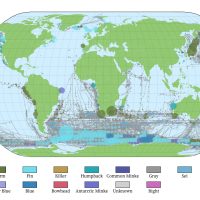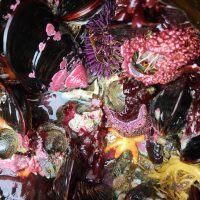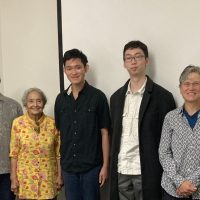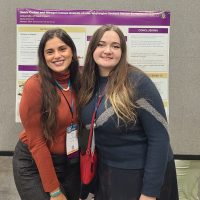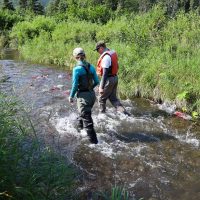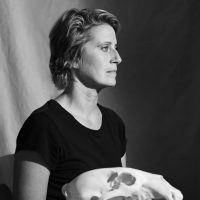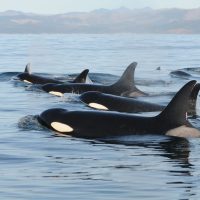Filter Results
Supporting Tribal-led salmon monitoring using computer vision
UW researchers are developing a drone-based salmon survey method that the Sauk-Suiattle can use to manage resources.
Read moreWhaleVis turns more than a century of whaling data into an interactive map
A team at UW, including Trevor Branch from SAFS and Zoe Rand from QERM, have created an online interactive map called WhaleVis, which lets whale researchers visualize the IWC’s data on global whale catches and whaling routes. From this, researchers can estimate the animals’ spatial distribution and the effort whalers put into hunts.
Read moreCelebrating LGBTQ+ in STEM
Celebrating and highlighting the work of LGBTQ+ people in science, technology, engineering, and math (STEM) has a special day on the calendar: November 18. Why this date? It is based on the 60th anniversary of American Astronomer and gay activist Frank Kameny’s fight against workplace discrimination, which he took to the U.S. Supreme Court.
Science is a place of innovation, research, and progress, but many communities are still marginalized in these spaces.
Read moreSAFS Graduate Student Symposium Program now live!
From corals, birds and salmon to microplastics, otolith microchemistry and fisheries management, join us for a day full of grad research from around the world.
Read moreIntegrating mathematics with fishery science: another year of the Varanasi Internship
Now running for over a decade, the Varanasi Quantitative Undergraduate Summer Internship Program brings together math and fisheries sciences in a unique experience for students, who spend a summer working on research projects at NOAA Northwest Fisheries Science Center (NWFSC).
A collaborative program jointly funded by NOAA Fisheries, SAFS and the UW Department of Mathematics, and endowed by Usha and S.
Celebrating diversity in STEM and winning student awards at SACNAS 2023
The National Diversity in Stem Conference (NDiSTEM) organized by the Society for Advancement of Chicanos/Hispanics & Native Americans in Science (SACNAS) is the largest multidisciplinary and multicultural STEM diversity event in the U.S., serving to equip, empower, and energize participants for their academic and professional paths in STEM.
At the 2023 event held in October in Portland, SAFS graduate student, Nicole Doran, won the research presentation prize for Best Graduate Student Oral Presentation in the field of Ecology and Evolution, and recent Marine Biology graduate, Olivia Anderson, won a Native American/Indigenous Student Research Abstract Award.
Witnessing one of nature’s most impressive migrations: a summer with the Alaska Salmon Program
Nestled among a set of glacial lakes in the Wood River system is where scientists with the Alaska Salmon Program spend their summers. From students just beginning their research journeys in aquatic sciences, to seasoned field technicians and faculty, the camps based on Lake Aleknagik and Lake Nerka are the temporary home for both scientists and the fish that they are studying: Pacific salmon.
Read moreThe scientists watching their life’s work disappear: Kristin Laidre featured in the NY Times
The Arctic is warming much faster than the rest of the planet. I study animals that are inextricably tied to the sea ice, which is disappearing. Narwhals spend most of their time in deep water, in and under dense ice. They need cold water. The other species I study is polar bears. Everything about being a polar bear is tied to the ice.
Read moreLooking to the past to inform the future
Historical ecology and data-limited fisheries stock assessment methods shed light on threatened Puget Sound Yelloweye Rockfish
By applying elements of historical ecology, fisheries science, and conservation biology in a highly collaborative research effort, researchers from the University of Washington School of Aquatic and Fishery Sciences (SAFS), NOAA Fisheries, and the Washington Department of Fish and Wildlife (WDFW) are delivering new insights into the status of Yelloweye Rockfish.
Open lab position for a Research Scientist/Engineer II with SAFS and NOAA
The University of Washington Whale and Dolphin Ecology lab and the Genetics and Evolution lab at NOAA Northwest Fisheries Science Center are seeking to hire a Research Scientist/Engineer II – Molecular Genetics Technician to support projects assessing marine mammal and fish population genetics using a wide variety of genetic lab techniques. The position will primarily support the genetic analysis of killer whale diets using fecal samples, with additional opportunities to work on various fish and marine mammal genetics projects expected.
Read more
